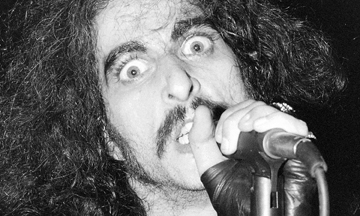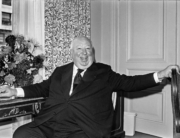
Bobyy Liebling, back in the day (Jeff Lee/Sundance Selects)
Produced by Sheena M. Joyce
Released by Sundance Selects
USA. 90 min. Not rated
Can a doom metal cult hero get out of his parents’ basement and off drugs to finally capitalize on decades of fan fervor? And will anyone else care?
Last Days Here follows the life of Bobby Liebling, who was the front man for Pentagram, one of the earliest hard rocking bands that helped birth the metal genre in the early 1970s. With limited record releases and notorious live performances—both acclaimed and blamed on Liebling’s dynamic and erratic behavior—scores of demos and unreleased tracks feed the legend, and he continues to be sought out by new generations of fans, including a new manager determined to revive his career.
But when directors Don Argott and Demian Fenton find him, and then follow him over three years in his 21st century existence, Liebling has been living in the sub-basement of his parents’ suburban Maryland house for decades, like a horrible ghost from the future in Wayne’s World. Even with extensive interviews, his parents’ tolerance and subsidy of his continuous, heavy drug use seem either oddly co-dependent or a desperate precaution to keep him—just barely—alive. (There is some mild irony that his civil servant father worked for the Department of Defense under Republican presidents.)
To fill in the gaps of Liebling’s addled memory (think of the old ad “This is your brain on drugs”), interviews with his former band mates and record industry contacts make clear that the missed career opportunities were entirely Liebling’s fault. His screw-ups ranged from being late for important appointments and gigs to confrontations with music producers, all amidst drug use so debilitating that he almost died on stage, when he did show up. A bit confusingly, original grainy VHS tape of Pentagram performing is blended with reconstructions. (Occurring in the days before cell phone cameras, there isn’t footage of the time Paul Stanley and Gene Simmons of Kiss came to Liebling’s door to check his band out and he stood them up.) Just when the sight of Liebling nodding off and tearing at his skin wears very thin, he is, amazingly, snapped out of his netherworld by the love of a young woman, but even that inexplicable relationship becomes mired in the ups and downs of his endless problems. In straining for a Hollywood ending, not all of his subsequent relapses are noted.
More of a problem for the audience is that the footage from the earliest days and various comebacks demonstrates little evidence of his performance charisma. With only snippets of lyrics and just partial songs heard (the title comes from a Pentagram song), his lasting influence and impact on fans around the world remains mystifying. There is also little evidence of the excellent documentaries Argott directed and Fenton edited, not the charming personalities of Rock School (2005) nor the thorough research in The Art Of the Steal (2010). There is more similarity to the arc of Sacha Gervasi’s much more entertaining and involving Anvil! The Story of Anvil (2009), but this documentary is haunted by better fictional films—the addict who did make it as a rock star in Gus Van Sant’s Last Days (2005) and even, unfortunately, the failed rocker in last year’s The Perfect Age Of Rock ’N’ Roll. Despite the miracle of the concluding uplift, the message is overwhelmingly that drugs will drown out the power of sex and rock ‘n’ roll.






Bobby’s father’s first boss was the Democrat LBJ. He was kept on for the Nixon and Ford administrations.